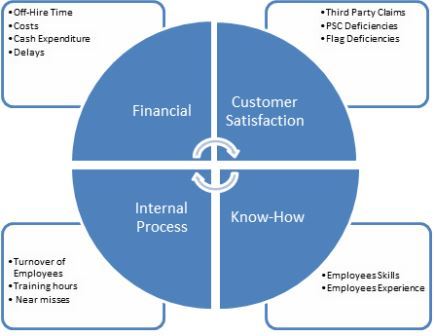One of the main contributions of the quality standards, such as ISO 9001, ISO 14001, is the self-assessment requirement of a company. For a company to achieve compliance must establish Key Performance Indicators (KPIs). By adopting this approach, it is easier for a company to measure the achievement of its goals. The KPIs, should be implemented among a company’s departments and occasionally, among its employees.
 A critical issue is that the KPIs should be used for simultaneous measurement of many different aspects of a company, such as human resources, the knowledge, the finance and the infrastructure. The goal of these standards is the customer’s satisfaction which, for a ship operator may be his flag state, the PSC authorities, the charterers or the underwriters (Read More Here).
A critical issue is that the KPIs should be used for simultaneous measurement of many different aspects of a company, such as human resources, the knowledge, the finance and the infrastructure. The goal of these standards is the customer’s satisfaction which, for a ship operator may be his flag state, the PSC authorities, the charterers or the underwriters (Read More Here).
There are several examples in private and public organisations where KPIs have been successfully applied, which, however, are generic and insufficient for the maritime industry. Therefore, in our project Nautilus, we revealed a set of KPIs, measuring the performance of a company based on its goals. A key aspect is that the decision maker may adjust the weighting of his KPIs for them to be updated with a continuously developed market.
The concept used in this approach is that the achievement of a goal goes beyond the profit targets of a company. Although significant, the financial numbers may not indicate any potential threat in achieving a predetermined goal. It also constitutes a simple way of passing to each part of the company, a simplistic idea of their contribution to the primary goals. Therefore, it is easy for each department in the ship operator’s organisation to self-evaluate its performance concerning the company’s policies and aims.
Therefore, a company's goals need to be measured by four performance perspectives:
- Financial
- Customer Satisfaction
- Internal Process
- Know-How
It is broadly acceptable nowadays, that the success of a company is greatly dependent on those employees, who are at lower management levels, and therefore, closer to the customers. This approach of distribution of common scorecards among departments is called ‘cascade’. Although challenging, in some cases it would be beneficial for each employee to have his private scorecard. It is also a matter of ethics since the performance of each employee can then be pragmatic, clear and rational.

